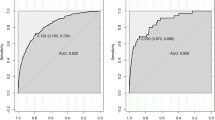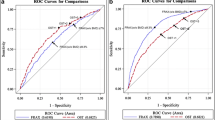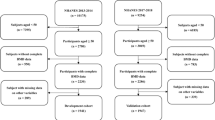Abstract
Summary
Clinicians need tools to identify patients most likely to benefit from bone mineral density (BMD) testing, for which cost–effectiveness does not allow generalized screening. This study supports the utility of osteoporosis risk assessment tools in selecting men for BMD testing. Different cutoff values may be appropriate for different countries and/or ethnic origins.
Introduction
Our aim was to evaluate the utility of three osteoporosis (OP) risk assessment tools in a large group of Portuguese men aged 50 or more and to determine the best cutoff value to be used for selecting men for bone densitometry.
Methods
We assessed the performance of three simple tools in 202 randomly selected men: body weight criterion (BWC), osteoporosis self-assessment tool for Asians (OSTA), and a modified version of the OSTA equation (OST). Previously published cutoff values (validated in postmenopausal women) and three additional cutoff values were tested. Sensitivity (SE), specificity (SP), predictive values, and area under the receiver operating characteristic (AUROC) curve for correctly selecting men with OP (defined by BMD testing) were determined.
Results
Mean age of the cohort was 63.8 years. According to the World Health Organization diagnostic categories, 16.8% had osteoporosis. The best performing cutoffs for correctly selecting men with OP for BMD testing were OST < 3 (SE = 75.5%, SP = 50.0%, AUROC = 0.632), OSTA < 3 (SE = 73.5%, SP = 58.3%, AUROC = 0.659), and BWC < 75 kg (SE = 73.5%, SP = 61.3%, AUROC = 0.674).
Conclusions
OP risk assessment tools seem to be useful in men aged 50 or more. Best cutoff values are different from those recommended for postmenopausal women. Different cutoff values may be appropriate for different countries and/or ethnic origins.
Similar content being viewed by others
References
Geusens P, Dinant G (2007) Integrating a gender dimension into osteoporosis and fracture risk research. Gend Med 4(Suppl B):S147–S161
Forsen L, Sogaard AJ, Meyer HE, Edna T, Kopjar B (1999) Survival after hip fracture: short- and long-term excess mortality according to age and gender. Osteoporos Int 10:73–78
Geusens P, Hochberg MC, van der Voort DJ, Pols H, van der Klift M, Siris E, Melton ME, Turpin J, Byrnes C, Ross P (2002) Performance of risk indices for identifying low bone density in postmenopausal women. Mayo Clin Proc 77:629–637
Kanis JA, Johnell O, Oden A, De Laet C, Mellstrom D (2004) Epidemiology of osteoporosis and fracture in men. Calcif Tissue Int 75:90–99
Marshall D, Johnell O, Wedel H (1996) Meta-analysis of how well measures of bone mineral density predict occurrence of osteoporotic fractures. BMJ 312:1254–1259
Kanis JA, Johnell O, Oden A, Johansson H, McCloskey E (2008) FRAX and the assessment of fracture probability in men and women from the UK. Osteoporos Int 19:385–397
Writing Group for the IPDC (2004) Diagnosis of osteoporosis in men, premenopausal women, and children. J Clin Densitom 7:17–26
Tavares V, Canhao H, Gomes JA, Simoes E, Romeu JC, Coelho P, Santos RA, Malcata A, Araujo D, Vaz C, Branco J (2007) Recommendations for the diagnosis and management of osteoporosis. Acta Reumatol Port 32:49–59
Schousboe JT, Taylor BC, Fink HA, Kane RL, Cummings SR, Orwoll ES, Melton LJ 3rd, Bauer DC, Ensrud KE (2007) Cost–effectiveness of bone densitometry followed by treatment of osteoporosis in older men. JAMA 298:629–637
Cummings SR, Cawthon PM, Ensrud KE, Cauley JA, Fink HA, Orwoll ES (2006) BMD and risk of hip and nonvertebral fractures in older men: a prospective study and comparison with older women. J Bone Miner Res 21:1550–1556
Nguyen ND, Pongchaiyakul C, Center JR, Eisman JA, Nguyen TV (2005) Identification of high-risk individuals for hip fracture: a 14-year prospective study. J Bone Miner Res 20:1921–1928
Orwoll E, Ettinger M, Weiss S, Miller P, Kendler D, Graham J, Adami S, Weber K, Lorenc R, Pietschmann P, Vandormael K, Lombardi A (2000) Alendronate for the treatment of osteoporosis in men. N Engl J Med 343:604–610
Ringe JD, Faber H, Farahmand P, Dorst A (2006) Efficacy of risedronate in men with primary and secondary osteoporosis: results of a 1-year study. Rheumatol Int 26:427–431
Orwoll ES, Scheele WH, Paul S, Adami S, Syversen U, Diez-Perez A, Kaufman JM, Clancy AD, Gaich GA (2003) The effect of teriparatide [human parathyroid hormone (1–34)] therapy on bone density in men with osteoporosis. J Bone Miner Res 18:9–17
Kaufman JM, Orwoll E, Goemaere S, San Martin J, Hossain A, Dalsky GP, Lindsay R, Mitlak BH (2005) Teriparatide effects on vertebral fractures and bone mineral density in men with osteoporosis: treatment and discontinuation of therapy. Osteoporos Int 16:510–516
Bates DW, Black DM, Cummings SR (2002) Clinical use of bone densitometry: clinical applications. JAMA 288:1898–1900
Al Attia H, Adams B (2007) Osteoporosis in men: are we referring enough for DXA and how? Clin Rheumatol 26:1123–1126
Weinstein L, Ullery B (2000) Identification of at-risk women for osteoporosis screening. Am J Obstet Gynecol 183:547–549
Michaelsson K, Bergstrom R, Mallmin H, Holmberg L, Wolk A, Ljunghall S (1996) Screening for osteopenia and osteoporosis: selection by body composition. Osteoporos Int 6:120–126
Cadarette SM, Jaglal SB, Murray TM (1999) Validation of the simple calculated osteoporosis risk estimation (SCORE) for patient selection for bone densitometry. Osteoporos Int 10:85–90
Cadarette SM, Jaglal SB, Kreiger N, McIsaac WJ, Darlington GA, Tu JV (2000) Development and validation of the Osteoporosis Risk Assessment Instrument to facilitate selection of women for bone densitometry. CMAJ 162:1289–1294
Lydick E, Cook K, Turpin J, Melton M, Stine R, Byrnes C (1998) Development and validation of a simple questionnaire to facilitate identification of women likely to have low bone density. Am J Manag Care 4:37–48
Sedrine WB, Chevallier T, Zegels B, Kvasz A, Micheletti MC, Gelas B, Reginster JY (2002) Development and assessment of the Osteoporosis Index of Risk (OSIRIS) to facilitate selection of women for bone densitometry. Gynecol Endocrinol 16:245–250
Salaffi F, Silveri F, Stancati A, Grassi W, Black DM, Steinbuch M, Palermo L, Dargent-Molina P, Lindsay R, Hoseyni MS, Johnell O, Richy F, Deceulaer F, Ethgen O, Bruyere O, Reginster JY (2001) An assessment tool for predicting fracture risk in postmenopausal women. Development and validation of the ORACLE score to predict risk of osteoporosis. Clin Rheumatol 12:519–528
Black DM, Steinbuch M, Palermo L, Dargent-Molina P, Lindsay R, Hoseyni MS, Johnell O (2001) An assessment tool for predicting fracture risk in postmenopausal women. Osteoporos Int 12:519–528
Salaffi F, Silveri F, Stancati A, Grassi W (2005) Development and validation of the osteoporosis prescreening risk assessment (OPERA) tool to facilitate identification of women likely to have low bone density. Clin Rheumatol 24:203–211
Koh LK, Sedrine WB, Torralba TP, Kung A, Fujiwara S, Chan SP, Huang QR, Rajatanavin R, Tsai KS, Park HM, Reginster JY (2001) A simple tool to identify Asian women at increased risk of osteoporosis. Osteoporos Int 12:699–705
Park HM, Sedrine WB, Reginster JY, Ross PD (2003) Korean experience with the OSTA risk index for osteoporosis: a validation study. J Clin Densitom 6:247–250
Richy F, Gourlay M, Ross PD, Sen SS, Radican L, De Ceulaer F, Ben Sedrine W, Ethgen O, Bruyere O, Reginster JY (2004) Validation and comparative evaluation of the osteoporosis self-assessment tool (OST) in a Caucasian population from Belgium. QJM 97:39–46
Li-Yu JT, Llamado LJ, Torralba TP (2005) Validation of OSTA among Filipinos. Osteoporos Int 16:1789–1793
Fujiwara S, Masunari N, Suzuki G, Ross P (2001) Performance of osteoporosis risk indices in a Japanese population. Curr Ther Res 62:586–594
Machado P, da Silva JA (2008) Performance of decision algorithms for the identification of low bone mineral density in Portuguese postmenopausal women. Acta Reumatol Port 33:314–328
Hochberg MC, Tracy JK, van der Klift M, Pols H (2002) Validation of a risk index to identify men with an increased likelihood of osteoporosis (abstract). J Bone Miner Res 17:S231, SA095
Adler RA, Tran MT, Petkov VI (2003) Performance of the osteoporosis self-assessment screening tool for osteoporosis in American men. Mayo Clin Proc 78:723–727
Kung AW, Ho AY, Ross PD, Reginster JY (2005) Development of a clinical assessment tool in identifying Asian men with low bone mineral density and comparison of its usefulness to quantitative bone ultrasound. Osteoporos Int 16:849–855
Ghazi M, Mounach A, Nouijai A, Ghozlani I, Bennani L, Achemlal L, Bezza A, El Maghraoui A (2007) Performance of the osteoporosis risk assessment tool in Moroccan men. Clin Rheumatol 26:2037–2041
Sinnott B, Kukreja S, Barengolts E (2006) Utility of screening tools for the prediction of low bone mass in African American men. Osteoporos Int 17:684–692
Skedros JG, Sybrowsky CL, Stoddard GJ (2007) The osteoporosis self-assessment screening tool: a useful tool for the orthopaedic surgeon. J Bone Joint Surg Am 89:765–772
Perez-Castrillon JL, Sagredo MG, Conde R, del Pino-Montes J, de Luis D (2007) OST risk index and calcaneus bone densitometry in osteoporosis diagnosis. J Clin Densitom 10:404–407
Lynn HS, Woo J, Leung PC, Barrett-Connor EL, Nevitt MC, Cauley JA, Adler RA, Orwoll ES (2008) An evaluation of osteoporosis screening tools for the osteoporotic fractures in men (MrOS) study. Osteoporos Int 19:1087–1092
da Silva JAP, Carapito H, Reis P (1999) Bone densitometry: diagnostic criteria in the Portuguese population. Acta Reumatol Port 93:9–18
Looker AC, Wahner HW, Dunn WL, Calvo MS, Harris TB, Heyse SP, Johnston CC Jr, Lindsay RL (1995) Proximal femur bone mineral levels of US adults. Osteoporos Int 5:389–409
Nelson HD, Helfand M, Woolf SH, Allan JD (2002) Screening for postmenopausal osteoporosis: a review of the evidence for the U.S. Preventive Services Task Force. Ann Intern Med 137:529–541
Brown JP, Josse RG (2002) 2002 clinical practice guidelines for the diagnosis and management of osteoporosis in Canada. CMAJ 167:S1–S34
Leib ES, Binkley N, Bilezikian JP, Kendler DL, Lewiecki EM, Petak SM (2006) Position development conference of the International Society for Clinical Densitometry. Vancouver, BC, July 15–17, 2005. J Rheumatol 33:2319–2321
Mattei JP, Arniaud D, Tonolli I, Roux H (1993) Aetiologies of male osteoporosis: identification procedures. Clin Rheumatol 12:447–452
McGinn TG, Guyatt GH, Wyer PC, Naylor CD, Stiell IG, Richardson WS (2000) Users' guides to the medical literature: XXII: how to use articles about clinical decision rules. Evidence-Based Medicine Working Group. JAMA 284:79–84
Acknowledgments
This work benefited from an unrestricted educational grant by the Merck Sharp and Dohme Foundation, Lisbon, Portugal.
Conflicts of interest
None.
Author information
Authors and Affiliations
Corresponding author
Rights and permissions
About this article
Cite this article
Machado, P., Coutinho, M. & da Silva, J.A.P. Selecting men for bone densitometry: performance of osteoporosis risk assessment tools in Portuguese men. Osteoporos Int 21, 977–983 (2010). https://doi.org/10.1007/s00198-009-1036-5
Received:
Accepted:
Published:
Issue Date:
DOI: https://doi.org/10.1007/s00198-009-1036-5




